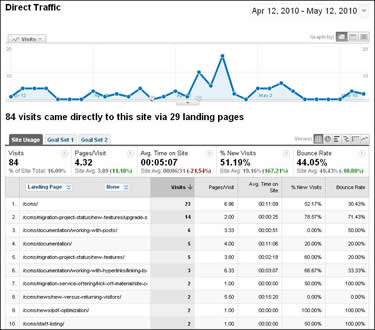Beep Beep: Monitoring Traffic Sources with Google Analytics
Today’s blog will focus on the Traffic Sources metrics which provide data about the different kinds of sources that send traffic to your site. Web traffic can be divided into two basic referring sources: organic and paid traffic. Organic traffic generates traffic to your site through unpaid listings found on search engines, directories, or guides such as yellow pages. Paid traffic generates traffic through, you guessed it, paid listing such as AdWords, or paid search engine keywords. As most sites found under the Carleton.ca domain are not e-commerce based-sites, your site’s traffic is generated from unpaid listings and the most useful traffic source metrics for you to monitor are Direct Traffic, Referring Sites, and Keywords.
Some tech-savvy users may also be interested in the Search Engine report which provides information on the top search engines used to access your web site. You will likely be surprised to learn that in most cases, Google is the most widely used search engine used to access your site.
Direct Traffic
Direct Traffic reports on how many visitors are coming directly to your site by clicking on a bookmark or typing your site’s URL directly into a web browser. You can access the Direct Traffic report from the following three locations in your Google Analytics Dashboard window:
- From the Dashboard window, select Traffic Sources Overview>View Report>Direct Report
- From the Dashboard side menu, select Traffic Sources>Direct Traffic
- From the Dashboard side menu, select Traffic Sources>Overview and from the Traffic Sources Overview window select Direct Traffic
Here are some of the things to look for when you are in the Direct Traffic window:
- From the Site Usage drop-down menu, select the Landing Page metric to see which pages on your site are getting bookmarked by your visitors.

- From the Site Usage drop-down menu, select the Visitor Type metric to see what percentage of these visitors are new which can reveal how well your offline marketing efforts of your domain are working.
Referring Sites
Referring Sites report the outside web site that sent visitors to your site. More often than not, your top referral site will be Carleton.ca. You can access the Referring Sites report from the following three locations in your Google Analytics Dashboard window:
- From the Dashboard window, select Traffic Sources Overview>View Report>Referring Sites
- From the Dashboard side menu, select Traffic Sources>Referring Sites
- From the Dashboard side menu, select Traffic Sources>Overview and from the Traffic Sources Overview window select Referring Sites
Here are some of the things to look for when you are reviewing the Referring Sites reports:
- Which referring sites are most useful to you?
- Where are your most valuable links located?
- If your social networking efforts are working for you (links from Facebook, Twitter)
- What are your referral sites’ bounce rates? If the bounce rate is high, there is a good chance that visitors were sent to your site under false pretenses or expected something different which may indicate an issue with your site. See Demystifying Bounce Rates for more information on interpreting the Bounce Rate metrics.
Keywords
The Keywords report provides detailed information on what keywords visitors are entering in search engines to find your site. You can access the Keywords report from the following locations in your Google Analytics Dashboard window:
- From the Dashboard side menu, select Traffic Sources>Keywords
- From the Dashboard side menu, select Traffic Sources>Overview. The Keywords are displayed under the Top Traffic Sources table.
- You can also view Keywords on most reports by selecting Keywords from the Site Usage drop-down menu.
Here are some of the things to look for when you are reviewing the Keywords report:
- What key words and key phrases are sending traffic from each search engine?
- Note these keywords as a reference for tagging images, blogs, news, etc.
Tips on generating organic traffic to your site
Content – The overall effectiveness of your site content is key in generating organic traffic to your site. Ensure that content is unique and specific to your site and visitors can find the exact information they need based on keyword searches.
Landing pages – If possible, all of your main internal web pages should be included in your navigation and linked from the homepage. The first page that a search engine takes visitors to is your homepage and once it indexes your homepage, it looks for further information through these links.
Keywords – Use strong keywords while writing content for your website. These keywords help search engines in indexing your Web pages.
Outside links – Build links with other web sites. If possible, have another department you partner with to point to your web site from theirs (this could simply be the Undergraduate department directing visitors to the Graduate department and vice versa). Ensure that your site is included in as many directories as possible (Carleton Yellow Pages and A to Z Website Index). If you are submitting your site to an external directory, it is important to choose an appropriate category before submitting to these directories.